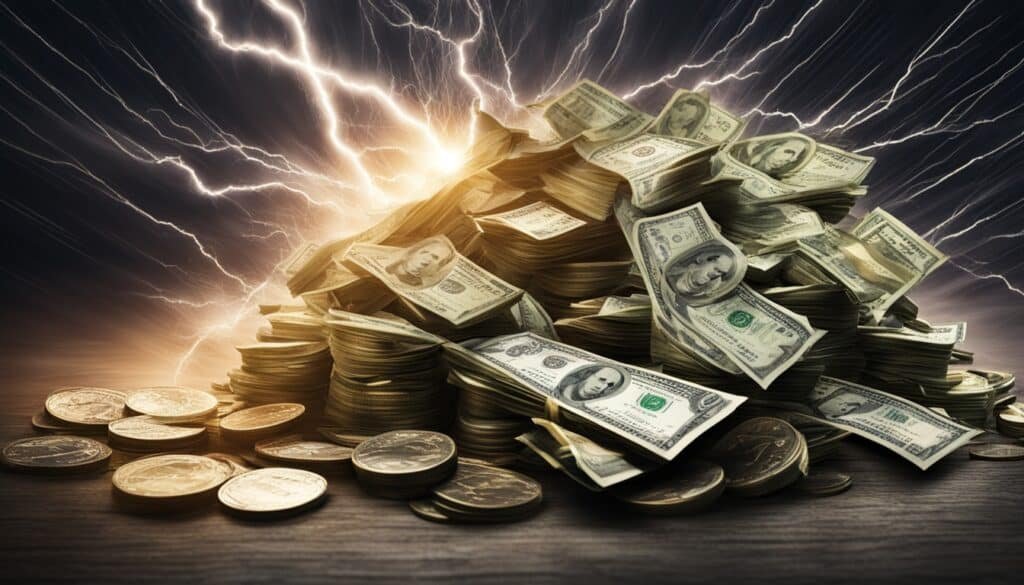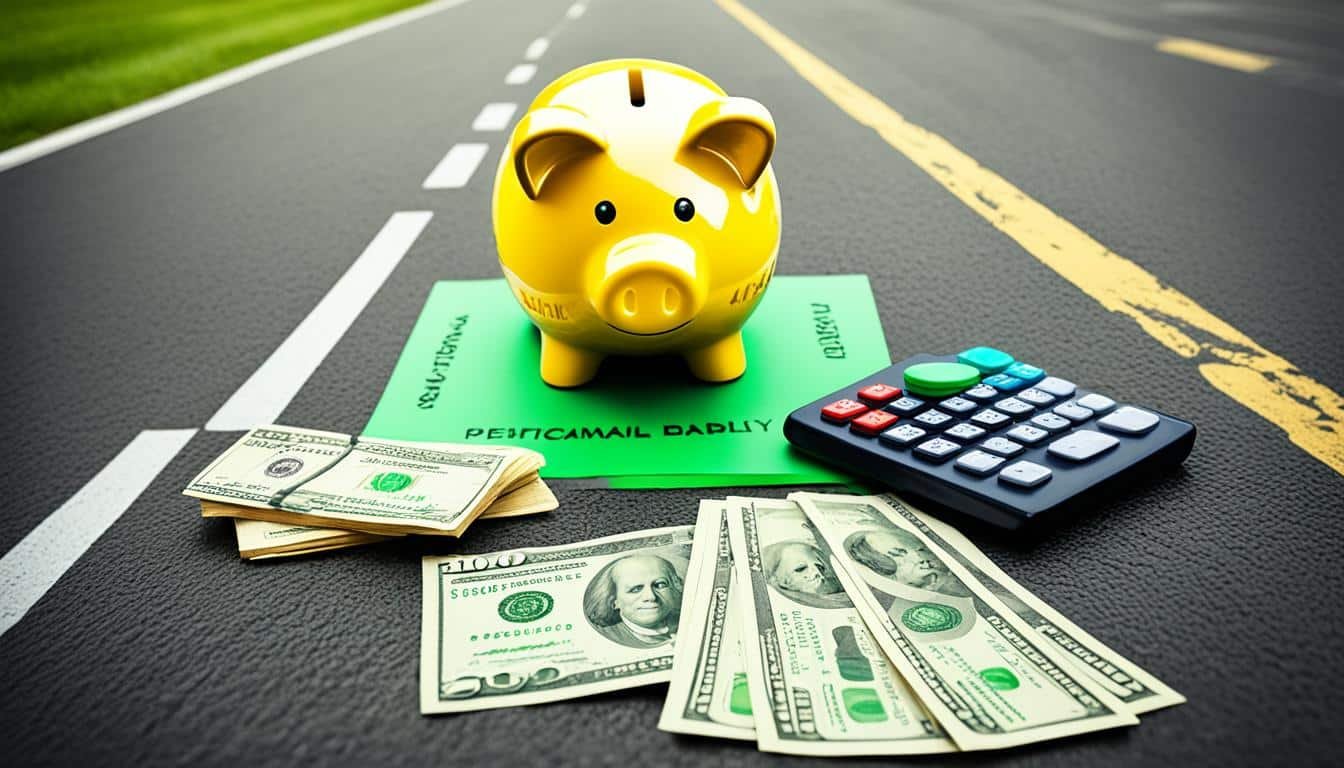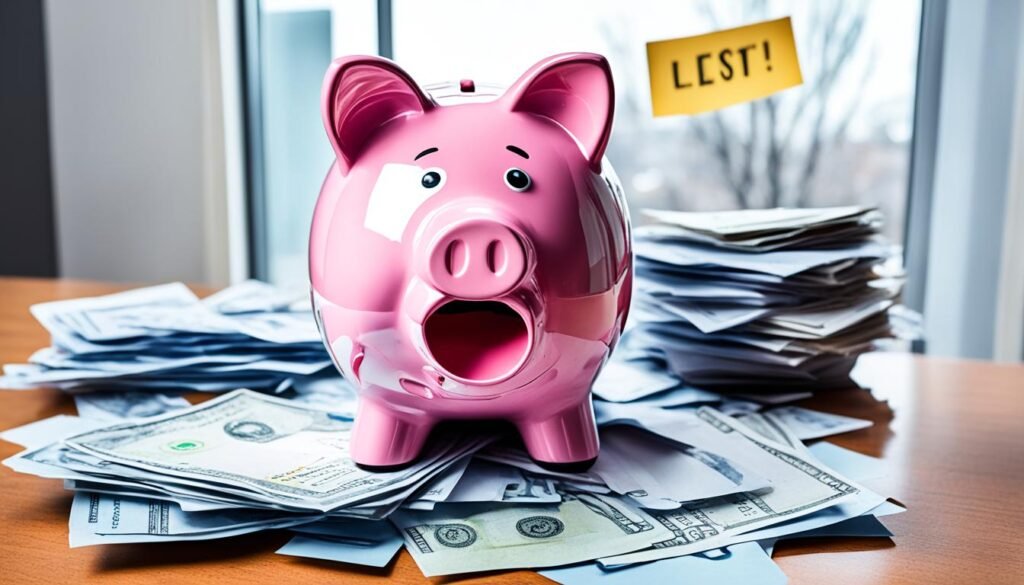A low credit score can have big financial impacts. People with poor credit are seen as risky. This makes getting loans, credit cards, and even a place to rent tougher. Also, you might face higher interest rates. This can slow down your plans to buy a home or a car.
Key Takeaways
- A low credit score can make it harder to get approved for loans, credit cards, and rental housing.
- Lenders and landlords may charge higher interest rates or require larger security deposits for those with poor credit.
- A low credit score can also impact employment opportunities and lead to higher insurance premiums.
- Maintaining a good credit score is essential for achieving financial goals and building wealth.
- Regularly checking your credit report and addressing any errors or negative items can help improve your credit score over time.
Impact on Loan Applications
A low credit score can really hurt your chances of getting a loan. Banks and lenders look at your credit score to see if you might not pay your loan back. If you have a bad credit score, they may say no to your loan applications.
Harder to Get Approved for Loans
Let’s say you want a house and need a mortgage. You usually need a credit score of 620 or higher. If your score is below 580, you might only get an FHA loan, needing a bigger down payment. Cars are the same — to get the best car loan rates, you should aim for a 660 or above. But if your score is lower, your interest charges will be much more.
Cutting it closer, if you want a good credit card, your score should be 670 or more. Getting the credit you need can be tough with poor credit.
“A low credit score can make it much harder to get approved for loans. Banks and lenders use credit scores to assess the risk of a borrower defaulting on a loan.”
If your credit score is low, you’ll find it tricky to buy big things like a house or a car. It shows how key it is to keep your credit profile healthy.
Higher Interest Rates

If your credit score is low, you might not get high loan amounts. Even if you do, you’ll pay more in interest. Higher rates mean your loans cost more over time.
A recent study showed people with good credit paid about 4.23% interest on a new $32,000 car. But those with worse credit, between 300 to 500, paid a super high 14.7% rate. For used cars, these differences were even bigger.
Credit scores affect mortgages a lot too. Someone with a 620 score might get a 4.8% rate on a $300,000 loan. But someone with a great score could get 3.2%. This means paying $275 more each month, or $99,000 over 30 years, for the same loan.
| Loan Type | Credit Score Range | Average Interest Rate |
|---|---|---|
| New Car Loan | 781 and above | 4.23% |
| New Car Loan | 300 to 500 | 14.7% |
| Mortgage | 760 to 850 | 3.2% |
| Mortgage | 620 | 4.8% |
These examples show how crucial a good credit score is. It can save you a lot of money on loans. So, it’s important to keep your score high for better loan terms.
“The worse your credit, the more you’ll pay in interest over the life of the loan.”
Renting Challenges
Renting can be hard if your credit isn’t great. Landlords check your credit to see if you might not pay rent on time. If your credit is low, finding a place to rent can be tricky.
Difficulty Finding Housing
Folks with low credit might need to work harder to rent a place. They might have to pay a bigger security deposit or get someone to sign with them. Sometimes, if your credit score is too low, landlords won’t rent to you at all. This can make finding a place tough.
Having a low credit score can also affect getting into places like assisted living facilities. Even if these places don’t take Medicare, they still check your credit when you apply.
- Landlords often pull credit reports to assess the risk of a tenant failing to pay rent on time.
- Consumers with low credit scores may have a harder time finding landlords willing to rent to them.
- Landlords may require larger security deposits or a cosigner from tenants with poor credit.
- The impact of a low credit score can extend to assisted living facilities, which may also conduct credit checks.
“Even older adults applying to assisted living facilities may face credit checks, as these establishments rely on private payments rather than Medicare coverage for long-term stays.”
If your credit is low, finding a place to rent takes extra effort. It means being ready to look hard and consider all kinds of options.
Employment Opportunities
Your credit history matters a lot when it comes to finding a job. Many employers check your credit, especially for jobs that require managing money. If your credit is bad, they might think you’re not good with money credit utilization rate lower your credit score several credit card companies. This could keep you from getting hired, even if you’re perfect for the job.
Employers look at your credit to see if you’re responsible and trustworthy. They worry that those who pay late or have lots of debt might cause issues. This is especially true for jobs involving money, like budgeting or dealing with financial secrets.
| Employer Concerns | Potential Impact of Low Credit Score |
|---|---|
| Financial Responsibility | Having a low credit score might make employers think you’re bad with money. They could worry about how you’d handle finances at work. |
| Trustworthiness | Bad credit might make employers doubt your honesty. They could fear you might engage in fraud or cause money problems. |
| Job Performance | They might believe that dealing with personal financial issues could affect your performance at work. |
To reduce the effect of bad credit on job hunting, deal with it directly. Try to boost your credit by paying off debt and fixing any mistakes on your credit report. Show that you can manage money wisely review your credit loan or mortgage help your credit see your credit poor or very poor credit. Some employers will let you explain your credit during an interview, too.
Having good credit is important for more than just getting a loan or a place to live. It also affects your job chances. So, it’s smart to be careful with money and aim for a great credit score.
Low Credit Score

Your credit score is a vital number that shows how well you handle money. It goes from 300 to 850 and tells of your credit history, credit utilization, and payment history. If it’s below 669, you might face some big problems.
A low score makes it hard to borrow money, get credit cards, or rent a place to live. Lenders see you as a bigger risk if your score is low. This often means getting turned down for loans or getting stuck with higher interest rates. It can really slow you down when you’re trying to buy something important or find a good place to live also affect your credit score ways to improve your credit could help your credit score could help your credit score.
Work can also be tough to find if your credit score is low. Employers sometimes look at your credit as part of the job application. A poor credit history could hurt your chances of getting hired.
To raise your low credit score, you need to be steady and patient. Make your payments on time, use less of your available credit, and clean up any mistakes on your credit report. By doing these good habits, your credit can get better over time.
| Credit Score Range | Credit Score Rating |
|---|---|
| 800-850 | Excellent |
| 740-799 | Very Good |
| 670-739 | Good |
| 580-669 | Fair |
| 500-579 | Poor |
| 300-499 | Very Poor |
Keeping your credit score healthy is key to your finances and future dreams. Knowing what a low score can do and working to fix it opens many doors score between 300 and 660 people with bad credit scores qualify for a credit card. Then, you can build a stronger financial life. Always strive to better your credit health.
Insurance Premiums
Hurting your credit score could really make a difference in what you pay for insurance. This goes for both your car and home. Insurance companies often look at your credit score to decide on the cost of your insurance. If your score is low, you might need to pay more than others.
Higher Rates for Auto and Home Insurance
Progressive, a big name in car insurance, says low credit scores point to more claims. Because of this, they often charge higher rates. While some states don’t allow using your credit score to set insurance rates, many others do.
The Consumer Federation of America also looked into this. They found that people with bad credit could pay much more for insurance. You could pay up to 91% extra for your car insurance and as much as 226% more for your home insurance if your credit is poor.
| Credit Score Range | Average Auto Insurance Premium | Average Homeowners Insurance Premium |
|---|---|---|
| Excellent (800-850) | $1,200 | $1,000 |
| Good (700-799) | $1,400 | $1,200 |
| Fair (600-699) | $1,600 | $1,500 |
| Poor (500-599) | $1,800 | $2,200 |
| Very Poor (300-499) | $2,300 | $3,200 |
If your credit score is low, you could pay a lot more for insurance. It can make it very hard to keep your finances in order. And it might stop you from reaching your money goals.
Utility Services
Having a low credit score makes it hard to get essential utility services. Companies providing electricity, gas, water, internet, and cable worry about not getting paid. So, they might ask for more things from people with bad credit.
They might ask for a deposit before you can use their services. How much you have to pay depends on their rules and your credit score. This money can be a lot, and it’s hard to pay upfront, even if you get it back later.
Companies might look at your credit more carefully if it’s bad. Or, they might not let you use their service at all. This is a big problem for things we all need, like electricity or water. While some rules protect people, not all services follow these rules closely.
If your credit score is low, it can cost you more to keep your utilities going. You might pay more each month. Or you have to pay extra money upfront, which is hard for many people. It puts them in a difficult spot financially.
“Having a low credit score can make it challenging to set up essential utilities like electricity, gas, and water. Utility companies often view low credit as a risk factor and may require hefty deposits or even deny service altogether.”
To lessen how much a low credit score affects your utilities, know what you can do. Learn about your options to fix or better your credit. You can get help from credit counselors, talk to the companies, or find different ways to pay that help.
Difficulty Building Wealth

A low credit score can make it hard to achieve your money plans. Poor credit leads to high interest on loans and credit cards. This means less money for saving and investing for your future.
It’s tough to escape the trap of bad credit. High costs of poor credit can make debt hard to pay off. This stops you from growing wealth through assets like home equity or other investments.
Obstacles to Financial Goals
Low credit scores make it tough to get loans for big buys like homes or cars. The high interest makes these buys cost more, slowing your financial growth. It hampers your dreams of owning a house or buying things that gain value over time.
- Paying more in interest on loans and credit cards reduces the amount you can save or invest.
- Difficulty obtaining financing for major purchases like homes and cars delays the accumulation of assets.
- The cycle of bad credit can be difficult to break, making it harder to reach your long-term financial goals.
To get past these challenges and grow your wealth, improving your credit is key. Pay off debt and keep your credit utilization strong. Tackling the reasons for bad credit can lessen the burden of high interest rates. This lets you move towards your financial goals.
Limited Credit Options
With a low credit score, you may find it hard to get credit cards and loans. People with poor credit often get subprime credit cards. These cards can have high fees and interest rates. Sometimes, they must get a secured credit card. This type needs a deposit to use.
It’s also hard to get a car loan or a home mortgage with a low credit score. Fewer lenders are willing to help. While it’s tough, using these alternative credit products can boost your credit over time. However, the terms won’t be as good as those for people with better credit.
Rebuilding your credit takes time and careful handling of your finances. Paying on time and using credit wisely can slowly open doors to better credit cards and loans.
Subprime Credit Cards and Secured Cards
Subprime credit cards are for those with poor credit. They come with high fees and interest. They can be expensive but might be the only choice. Secured credit cards ask for a deposit. They are good for improving credit over time.
| Credit Product | Typical Credit Score Range | Fees and Interest Rates | Advantages | Disadvantages |
|---|---|---|---|---|
| Subprime Credit Cards | Poor to Fair (500-670) | High annual fees, APRs can exceed 20% | May be the only option for some consumers | Costly, can be a temporary solution |
| Secured Credit Cards | Poor to Fair (500-670) | May have annual fees, but typically lower APRs than subprime cards | Can help build credit over time, refundable security deposit | Requires a security deposit, may have limited credit limits |
These options can help rebuild credit. But it’s key to improve your credit score to get better loans and credit cards.
In summary, having a low credit score limits your financial options. This makes it hard to get credit cards, loans, and other services. Understand these barriers and work on improving your credit to get better opportunities.
Also Read: How Can You Qualify For Government Loans?
Conclusion
A low credit score can make it hard to get loans, rent a home, or find good jobs. But, with hard work, you can make it better over time. Credit monitoring, credit counseling, and debt management are great tools. They can help you fix your credit and reach your money goals.
It’s key to pay bills on time, lower your debt, and watch your credit reports. This way, you can slowly boost your credit score and find new chances with money. The road to credit repair might take a while. But, the good things that come from it are worth the effort. With a plan and support, you can make your credit strong. This leads to a more secure financial future.
Knowing the downsides of a low credit score and actively fixing it can bring great perks. Like better loan deals, your dream home, and cheaper insurance. Making your credit a priority increases your financial power. It sets you up for more security and success.
FAQs
Q: What are the consequences of having a low credit score?
A: A low credit score can affect your ability to obtain new credit or loans, result in higher interest rates, limit your options for financial products, and impact your overall financial health.
Q: How does a bad credit score impact your credit report?
A: A bad credit score can lead to negative marks on your credit report, affecting your creditworthiness and making it more challenging to secure favorable loan terms.
Q: Why is it important to maintain a good credit score?
A: Maintaining a good credit score is crucial as it signifies your creditworthiness to lenders, enables you to access better financial opportunities, and can lead to lower interest rates on loans.
Q: What steps can I take to improve a bad credit score?
A: You can improve a bad credit score by paying bills on time, reducing debt, checking your credit report regularly, and working on establishing a positive credit history.
Q: How does a low credit score impact your ability to get a mortgage?
A: A low credit score can make it more difficult to qualify for a mortgage, result in higher interest rates, or even lead to outright rejection of your mortgage application.
Q: What factors can affect your credit score?
A: Factors that can impact your credit score include payment history, credit utilization ratio, length of credit history, types of credit accounts, and recent credit inquiries.
Q: How can monitoring your credit help improve your credit score?
A: By monitoring your credit regularly, you can identify errors or fraudulent activity, track your progress in improving your credit score, and take proactive steps to maintain or increase your score.
Source Links
- https://www.investopedia.com/the-side-effects-of-bad-credit-4769783
- https://www.bankrate.com/credit-cards/bad-credit/the-high-cost-of-a-low-credit-score/
- https://www.cnbc.com/select/side-effects-of-bad-credit/

